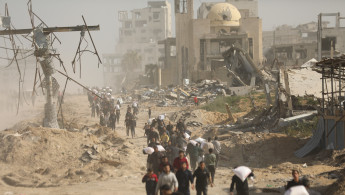Israeli military 'did fire' at civilians collecting aid in Gaza 'Flour Massacre'
The Israeli military said on Friday that its troops did fire on civilians collecting aid packages on Al-Rashid Street last month in which 112 Palestinians died and hundreds more injured in what was dubbed the 'Flour Massacre'.
An internal 'command review' conducted by the military regarding the incident with its troops in northern Gaza on 29 February revealed that soldiers "did fire at a number of suspects," claiming that civilians who approached their forces "posed a threat to them".
Thousands of Palestinians had gathered in the early morning to wait for several trucks bringing bags of flour to the north of Gaza, where 300,000 people are believed to be living in famine-like conditions following Israel's siege which has blocked aid deliveries for months.
Personal testimonies indicated that Israeli troops opened fire on crowds of men who had gathered around the trucks at the Al-Rashid roundabout—an aid distribution point—causing chaos and a rush of people. At least 112 people died and over 750 were injured in the attack, Gaza's health ministry said.
Israel said its military was present to oversee the distribution and monitoring of around 30 lorries which were travelling up the Al-Rashid coastal road. The aid was reportedly from Egypt after the World Food Programme said earlier in February that it was now too dangerous to deliver to the north.
According to the statement from the Israeli military, "dozens of Gazans advanced towards nearby IDF troops up to several meters from them, and thereby posed a real threat to the forces at that point".
Immediately afterward, Israeli officials denied knowledge of the incident but later retracted their claims, admitting that it likely caused "no more than 10" deaths, with the majority resulting from a stampede and being run over by the aid trucks.
The military later released edited drone footage purporting to show the chaos of the crowds around the trucks and military vehicles, including tanks, in the vicinity. However, critics argue that this video appears to have been edited.
The atrocity triggered worldwide condemnation including from Germany, Qatar, and Turkey, who called for independent investigations and for an urgent explanation from Israel.
In its Friday statement, Israel announced it would conduct a deeper probe into the incident through its 'Fact Finding and Assessment Mechanism,' responsible for "examining exceptional incidents that occurred during the fighting".
However, human rights groups have historically cast doubt over Israel's ability to investigate its own military.
An investigation by Geneva-based Euro-Mediterranean Human Rights Monitor into the February aid atrocity found that "dozens of victims suffered gunshot wounds, rather than being run over or crushed, in contrast to what the Israeli army spokesman claimed".
The organisation stated that such unlawful killings of Palestinian civilians constitute "serious violations of international humanitarian law and are war crimes".
A second investigation from the human rights monitor analysed bullets and shrapnel found at the scene and in the victims which showed that the type of bullet came from assault rifles used by the Israeli military.
The organization said that such unlawful killings of Palestinian civilians amount to "serious violations of international humanitarian law and are war crimes".
Throughout its offensive in Gaza, the Israeli army has been repeatedly accused of targeting civilians and killed more than 30,000 people, mainly women and children, in five-months of war.




 Follow the Middle East's top stories in English at The New Arab on Google News
Follow the Middle East's top stories in English at The New Arab on Google News
![A group of Palestinians, foreign and Israeli activists gather to participated in an olive picking event on the land in the town of Battir, which is under threat of confiscation by Israel in Bethlehem, occupied West Bank on 8 November 2024. [Getty]](/sites/default/files/styles/image_330x185/public/2182930803.jpeg?h=199d8c1f&itok=__0LgGsa)

![People gathered around the rubble of destroyed houses to search for survivors [Getty]](/sites/default/files/styles/image_330x185/public/2024-11/GettyImages-2184733820.jpg?h=199d8c1f&itok=NiM1LO2f)